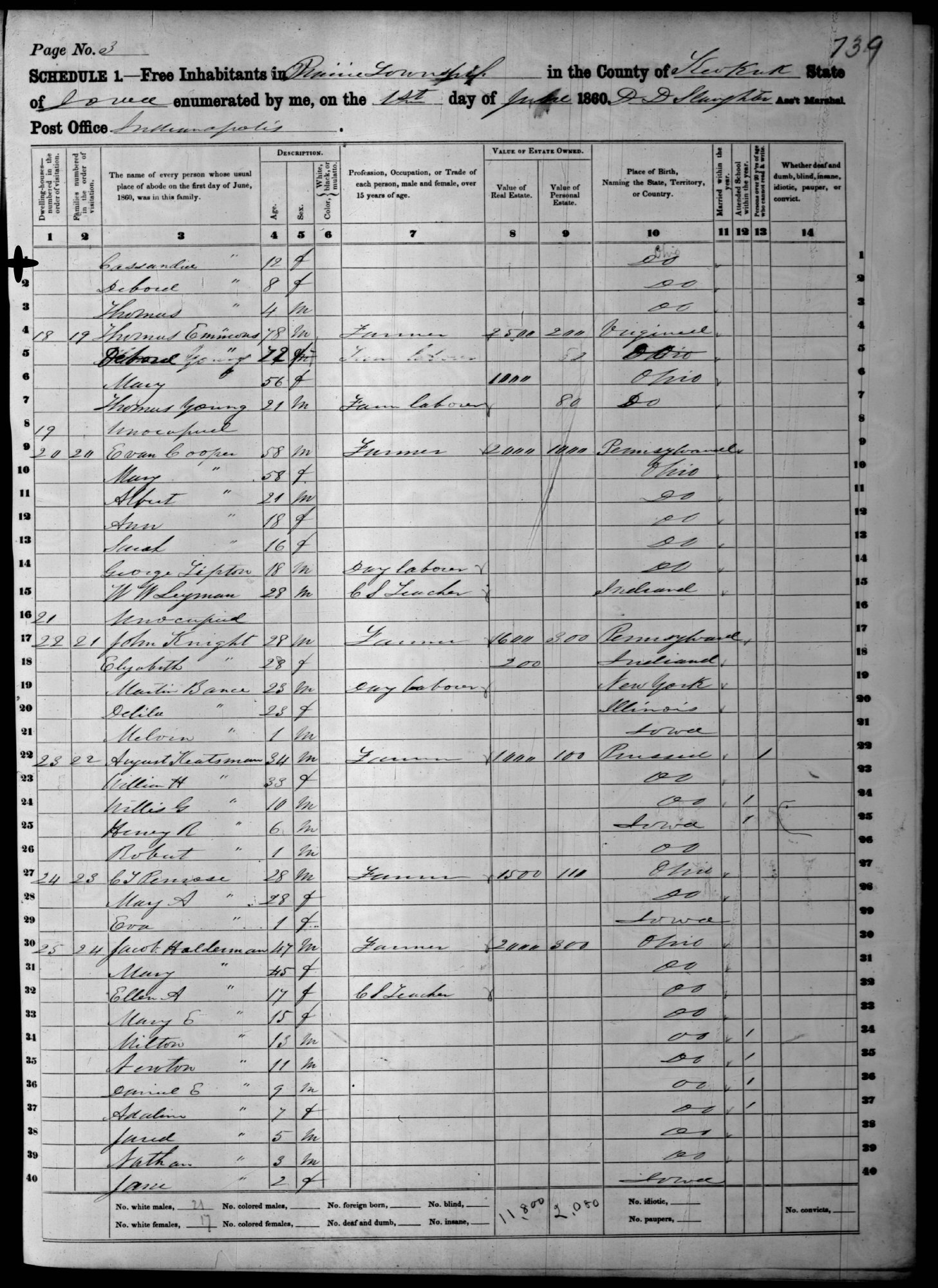Notes for THOMAS EMMONS:
Son of Serinus and Rebecca (Grubbs) Emmons.
Born: October 11, 1781 in Spring Creek Meeting, Mahaska County, Iowa.
Died: December 30, 1861 in Unknown.
Buried: About December 30, 1861 in Spring Creek Cemetery, Mahaska County, Iowa.
Will Probate: February 3, 1863 in Keokuk County, Iowa.
Occupation: Farmer.
Census:
1820 - West Township, Columbiana County, Ohio.
1830 - West Township, Columbiana County, Ohio (listed as Thomas Emons).
June 1, 1860 - Prairie Township, Keokuk County, Iowa.
Married: (1) Mary Davis March 9, 1803 in Frederick County, Virigina.
(2) Deborah Schooley before 1854 in Unknown. She married (1) Josiah Stratton September 30, 1812 in Salem, Columbiana County, Ohio.
In the 1860 census, we find Thomas Emmons, age 78, in Prairie Township, Keokuk County, Iowa, owning $2500 in real estate and having $200 in personal property. Also in the household are Deborah, age 79, and Mary, age 56 (so say my notes; perhaps it should be 46), who owns $1000 in real estate. All of Thomas and Mary's children except Rebecca and Cassandra, who had died without issue, are named in his will. Also named is his wife, Deborah, who is to have the property she brought with her to the marriage, one third the proceeds from the sale of his moveable property, and, during the rest of her life, the income from Thomas' eighty acre homestead and one cow. Grandsons Micajah and Davis, are to split the share of their dead father, except for fifty dollars which were to go to their mother, and "if my grandson Davis Emmons (who is supposed to have died at sea in the Pacific ocean in the fall of the year Eighteen hundred and fifty three whilst on his way to California) should not appear before the final settlement of the Executors..." Micajah is to have his brother's share.
Obituary:
[Died], on the 30th of 12th mo., 1861, in Keokuk Co., Iowa, THOMAS EMMONS, in the 81st year of his age, a minister of Spring Creek Monthly Meeting, Iowa. He was a native of Virginia, and in his youth, he was accustomed to fashionable life and military training, and was led into the various pastimes and follies of the day. But being convinced of the
fundamental principles of the Christian Religion, he states that many were his conflicts and intense his suffering in feeling conviction for sin. He sought in one branch of the Christian church for relief to his troubled spirit, but in vain. By this time he was enabled to see that neither war nor slavery was accordant with the principles of Christianity. His class leader was his military instructor in training; and his minister advocated slavery. While under this state of things, God was pleased to make this extremity his opportunity, and sent that
eminent minister, Nathan Hunt, under whose instrumentality he was convinced of the principles of Christianity as held by the Society of Friends, and he was enabled to abandon some of those practices to which he had long been accustomed. He was called a Quaker; and many of those who had been his friends, and some of his relations, became his
persecutors, and for a long time thought to drive him from his purpose; but the Lord taking him, as it were, in the hollow of his hand, and becoming his law-giver and his shepherd, he was led in and out and found pasture. Having an increasing family, and being surrounded by slavery with all its attendant evils, he saw the difficulty of rearing a family
as he wished under such circumstances, and resolved to remove to a free State. In the fall of 1806, he started for Ohio, and reached Columbiana County the following Spring, where he soon after became a member of the Society of Friends; and having experienced what it was to be brought out from the thraldom of sin and death, he was made willing to go forth and proclaim to others the Gospel of peace and salvation. He suffered heavy distraints in maintaining his testimony against war; being by this means reduced to entire penury at one time, and then, too, with a large family to support. He was never known to murmur, for the Lord was his staff,
and the God of Jacob his shield and buckler, and he who said that the flocks on a thousand hills are mine, sustained him and his large family,
and blessed him "in basket and in store." In supporting a faithful testimony against slavery, he made considerable sacrifice in avoiding the
use of slave-made sugar, and obtaining goods made of free-labor cotton. At a late period of his life he was induced to remove to Iowa, where, in the scattered condition of Society, he often found it necessary to spend and be spent for the promotion of the Redeemer's cause; frequently being heard to say that he never stayed away from meeting when he could have gone, but that he felt he had sustained a loss, and notwithstanding his advanced life, he was enabled in his new location to contribute much to
the building up of Society. He bore a protracted illness with Christian fortitude, and notwithstanding the severity of pain attendant upon his disease, yet he was enabled to joy in the Lord and frequently to drop a word of counsel or encouragement to those around him. In relation to his own eternal prospects he looked forward with the most lively hope to the time when he would be liberated to sing a song of praise to the Lord God
and the Lamb. (Friends' Review, 1862, vol xv, p 505-6.)
